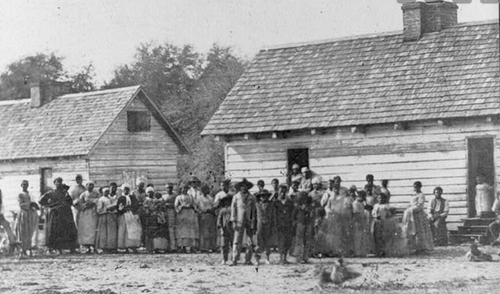
- Your name. The one that ties you to your people.
- I have one. I see it there, in the hundreds of records
- my son has put into a growing tree,
- looking for his place in it all.
- If you are Black in these united states, your family name,
- one that may have been assigned or borrowed,
- goes back only so far, then disappears, in a sea of evil.
- You will not find your place in it all.
- Your family may be in one of the documents
- my son has unearthed in his searching.
- There is no way of knowing.
- Lavenia, negro woman
- Archy, negro man
- Alley, negro girl
- Luke, negro man
- Peggy, negro woman
- Cesar, negro boy
- Bought from Joshua Bland, April 22, 1774, for $364
- Sold to William Norris, December 1, 1818, for $147
- Bought from Frances Posey, February 2, 1834, for $580
- Year after year, sales and purchases,
- in column after column,
- in carefully inked ledgers.
- Such beautiful penmanship.
- Such meticulous record-keeping.
- Boys fetch high prices, as much as $791—
- such investments yield high returns
- in decades of crops planted, harvested, taken to market,
- in houses built, roads cleared, new properties sired.
- The names of the people bought and sold change,
- pages of people, “Christian” names only.
- To their buyers and sellers, “nigras” didn’t have families.
- But the family names of those “Christian” men are there.
- Again and again—my family name.
- .
- What is there to do, now?
- My Carolina father was a linthead,
- the bottom of the white pecking order in that harsh south,
- into the mills at 13, a runaway to sea at 16.
- There’s nothing to deed over, no blood-money to transfer.
- Generations of buying and selling human beings
- came down to one scared white boy running for his life,
- away from bosses who saw him as trash,
- away from a life of outhouses, and a death of white lung,
- away from a lesser, minor servitude to a boss’s demand
- for a return on the investment made in his meagre wages.
- And now it’s down to me
- staring at that ledger and wondering
- how the books can ever be balanced.
- There’s respect,
- for all whose humanity was denied,
- all who survived,
- all who were denied families, denied family names,
- all who died without their families around them.
- There’s attention,
- to the value and the needs of the living,
- with a voice,
- with a vote,
- with my own writing,
- with raising anti-racist sons,
- with welcoming a new, wider centering of power,
- with amplifying the voices of the long silenced,
- with years of putting their work before my own.
- It isn’t enough.
- I know.
- There is no enough.

